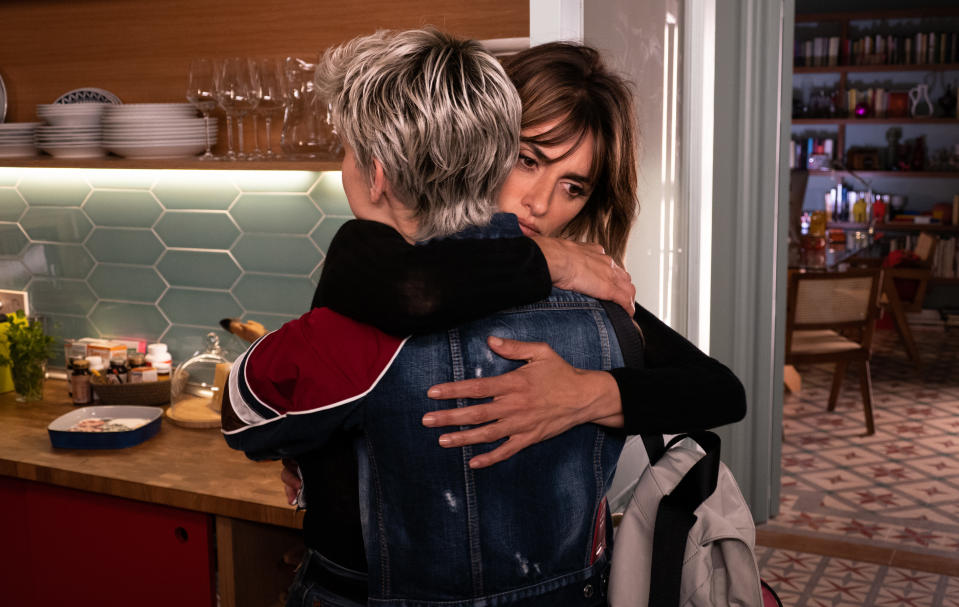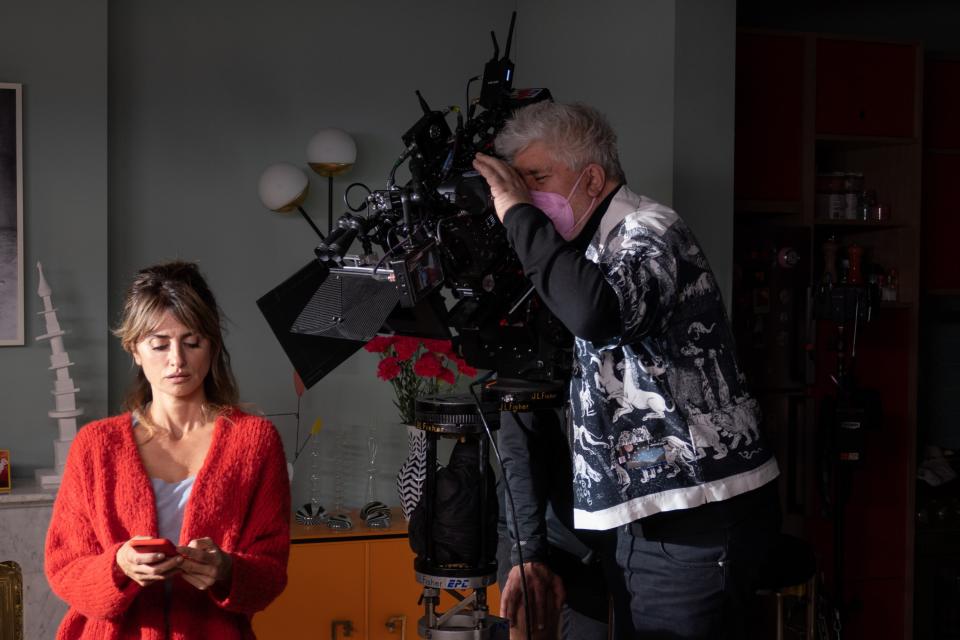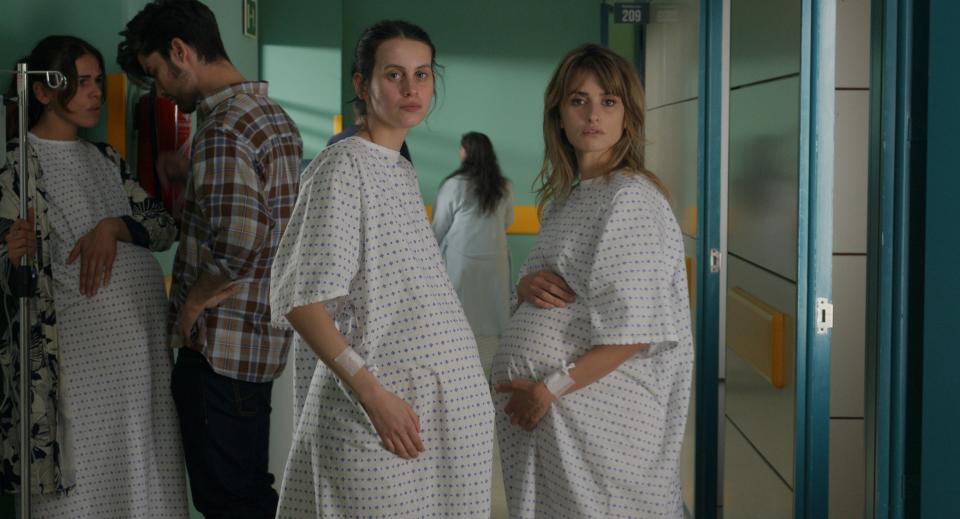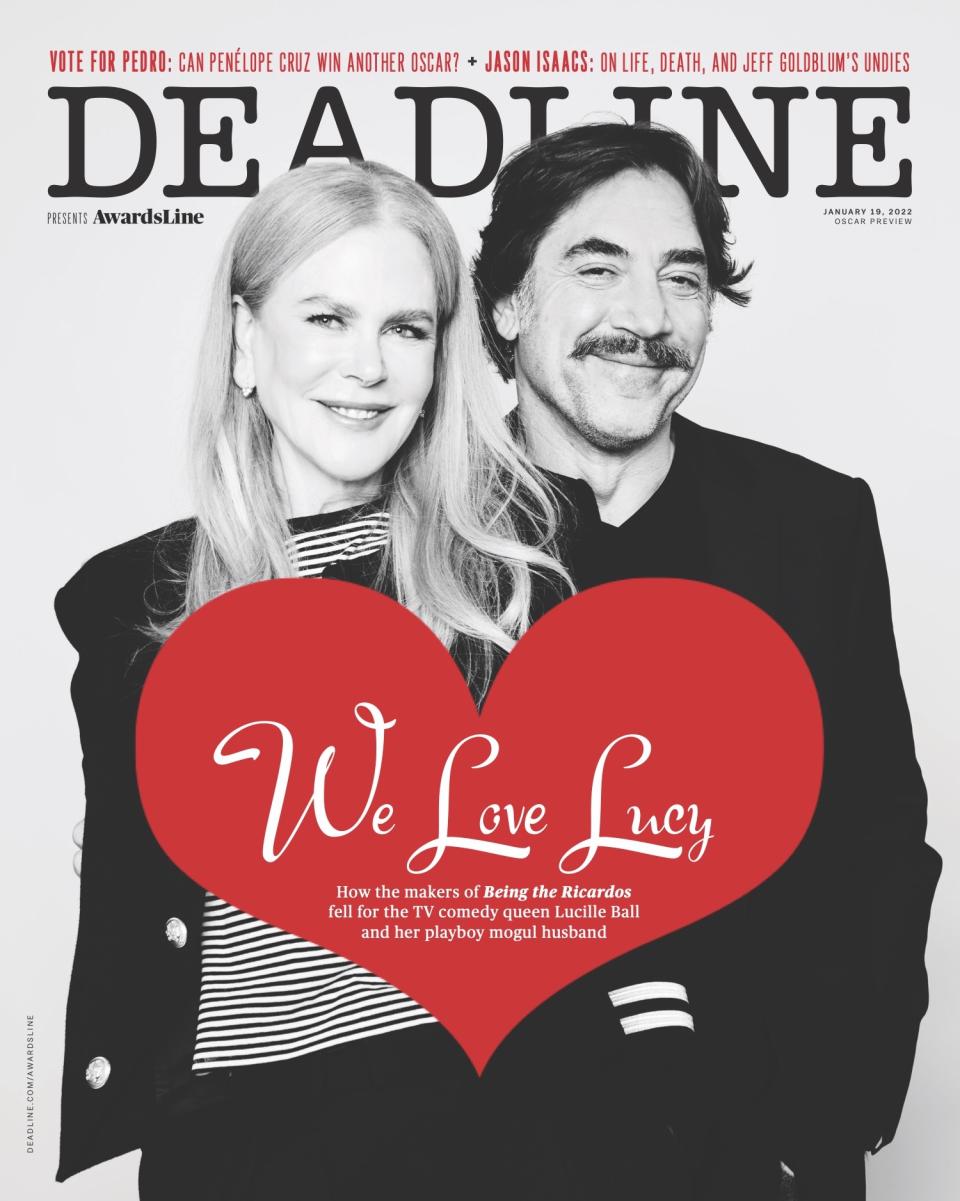‘Parallel Mothers’ Star Penélope Cruz On Working With Pedro Almodóvar And His Huge Influence On Her Career By “Pushing Me To Try To Become An Actress”

Penélope Cruz is running late. It’s lunchtime in Madrid, but she hasn’t had time to eat, so she excuses herself as she nibbles on a slice of jamón. “I need to eat something or my blood sugar goes down,” she says apologetically. Christmas is days away, but before she can even think about enjoying the break with her husband and two children there’s still a lot of work to do. In a few weeks’ time, her spy romp The 355 will hit screens, but more pressing is the U.S. release of Parallel Mothers, her seventh film with Spanish legend Pedro Almodóvar, and the very real possibility of a fourth Oscar nomination.
Parallel Mothers raised the curtain on awards season when it opened this year’s Venice film festival and, against stiff competition, it has stayed the course. It has also charmed audiences into keeping its secrets. Part love story, part political drama, it also delivers a powerful twist, which Cruz is keen to keep under wraps. In it, she plays Janis, a chic photographer who is fighting to excavate a mass grave in her family’s village where her great-grandfather may be buried. This leads her to contact a forensic anthropologist, who leaves Janis pregnant and alone. In her maternity ward she meets Ana (Milena Smit), a young woman recovering from a traumatic sexual assault, and the two strike up an unlikely friendship. “Two fishes swimming in opposite directions,” Cruz says.
More from Deadline

Janis, she thinks, is the hardest role she’s ever had to play. “Because she’s suffering so much, but she has to hide it. She has to become an amazing liar with people that she loves, but she does it out of survival. We cannot forget that she’s an orphan and she’s been raised by her grandmother. She’s very grateful for that, but she has grown up feeling, Why don’t I deserve a mother, a father, a family, something a little more normal in my life? Finally, when she gets pregnant, her dream is coming true, and when she’s finally happy with this baby… ” Well, that’s when things get interesting.
Almodóvar has had this story in mind for so long that when he first mentioned it to Cruz, during the press tour for 1999’s All About My Mother, she was young enough to play Ana. Surprisingly, Cruz thought nothing of it at the time. “He just has so many stories cooking in his mind,” she says. “Sometimes he will share a story, then never do it and throw it away. Sometimes we are traveling, promoting a film, and he’s writing three scripts at the same time—and he doesn’t know if he will ever do just one of those scripts or all of them. Nobody knows. So, I try not to ask him too many questions.”

Iglesias Mas/Sony Pictures Classics/Courtesy Everett Collection
The pair have known each other for nearly 30 years now, and though they are close, they don’t ever let that get in the way of the work. “That’s why, on the set, we create a little veil of distance,” she says. “We don’t plan it, but we behave differently. Maybe it’s a way to protect the relationship and to protect the work. I asked him for the first time, a few months ago, if he realized that we were doing that—that we change with each other when we are on set. He said, ‘Yeah, it’s true. But it’s working, so let’s keep it like that.’”
If Cruz’s young self could see her now, her mind would surely be blown. As a child, she was on course to be a dancer, having trained in classical ballet, but it was seeing Almodóvar’s early films as a teenager that changed the course of her life. She even tried, for want of a better word, to stalk him. “I was taking a lot of walks in his neighborhood, just in case. I was going to the cinemas that he was going to, the bars that he was going to. And always, when I told my friends, ‘Today we’re going to see Pedro,’ it happened.”
If not for him, would she have continued dancing? Or would she have got into acting in a different way? “I don’t know,” she says, “because he was such a huge influence. Movie after movie [he was] pushing me to try to become an actress, which sounded like science fiction for me and my family. Seeing Women on the Verge and then Tie Me Up, Tie Me Down and High Heels was revolutionary for me, and I felt like I had to try. That’s why I looked for an agent, went to a theater school, and started to go to castings. He called me after my first two movies, Jamón Jamón and Belle Epoch, which I was very lucky to have as a calling card.” What was her reaction? “I thought it was a joke, of course.”
In those early days, Cruz tried to have it all. On top of normal school there was theater school twice a week, and ballet classes four times, plus castings. “Now, I look back and I think, OK, that was risky,” she says. “I wasn’t interested in going out, I was so focused on studying and trying to work. I never stopped. I was going six days a week non-stop. But there was a point where I was a little bit scared because I was not resting enough. I was in those years of hormonal changes and that can also have a big effect on you.

Iglesias Mas/Sony Pictures Classics/Courtesy Everett Collection
“Thank god I always stayed away from drugs, or drinking,” she says, “because I am not good with drinking. It just doesn’t work for me. It makes me fall asleep, or it makes me feel weird. But I was a workaholic from very early age. And then I realized that even through my 20s and my 30s, I was still like that. I would wake up in the middle of the night and answer emails, and that was not healthy at all. But sometimes you have to learn, I guess, from making those mistakes.” She looks around. “If my mother could hear me now, she would say nothing has changed. She would say I’m still a workaholic.”
Cruz, like Almodóvar, comes from a tight-knit family. Her father died in 2015, but she remains close with her sister and brother—and especially her mother, who she cites as the biggest role model in her life. “Maybe most people would say that,” she says, “but I am so grateful to her, for her strength and her inspiration every day. She was working very hard, raising us. She had a beauty salon and she worked six days a week. She worked as hard as my dad, and they passed on very strong values to us. She’s a great feminist by nature, and that’s what I saw at home—they treated me and my sister the same as my brother. And she’s very young. She’s, like, 68, so we are best friends.”
It’s likely that this is where Cruz gets her strong sense of cultural identity. When she first started getting offers from Hollywood, she always went with a return ticket. “My goal was to be able to combine the work there with the work in Europe,” she says. “In Europe, I was working not only in Spain, but also in Italy and in France. I moved [to the U.S.] for a few years, but I was always coming back here, many times a year to see my family and also to work. I never stopped working in my country or in my language.”
Since her children—Leo, 12, and Luna, 8—were born, Cruz has cut down on all those acting commitments. “Being a good mother is my priority,” she says, “and I don’t want to miss a second of what goes on with them.” Her husband, Javier Bardem, meanwhile, is on a winning streak of his own, after the record-breaking local success of his film The Good Boss, and critical acclaim for his portrayal of Ricky Ricardo in Being the Ricardos. Are they competitive? “No, I don’t think so, because we never compete for the same roles or the same movies. Sometimes when we are preparing a character we talk about ideas and hear suggestions from the other person. It’s not like we can do that every day, but sometimes it happens and it’s really beautiful to be able to share that.”
She definitely has plans to return, however, possibly even behind the camera. “That’s been my dream since I was 16 or 17,” she says. “One of my first conversations with Pedro was about that, and he said, ‘Why don’t you do it now? It doesn’t matter that you’re young.’ So, I directed some ads and a documentary about children with leukemia. Someday I would love to direct a feature film, too, but my kids are too young for that. I’m directing a documentary. I’d love to tell you what it’s about, but I can’t. It’s going to take me about two years, and it’s a real passion for me. It moves a lot of things in me.”

There is, of course, also the possibility of another reunion with Almodóvar. What is it about him that keeps her coming back? “I think he understands women,” she says. “He respects us and kind of worships us because of the relationship he had with his mom. I understood everything when I met his mother—his mother was really special, really funny, a really original character. And that’s how he grew up, always observing women, spying on their secret conversations and being fascinated by all the things that they were not saying. I know a lot about his childhood and he was always interested in that. He finds female characters fascinating, and he writes some of the greatest characters in cinema. I’m very lucky that I’m able to play so many of them.”
Best of Deadline
Cancellations/Renewals Scorecard: TV Shows Ended Or Continuing In 2021-22 Season
New On Prime Video For January 2022: Daily Listings For Streaming TV, Movies & More
Winter Premiere Dates For New & Returning Series On Broadcast, Cable & Streaming
Sign up for Deadline's Newsletter. For the latest news, follow us on Facebook, Twitter, and Instagram.

 Yahoo Movies
Yahoo Movies 